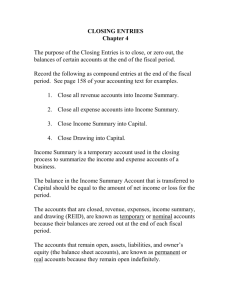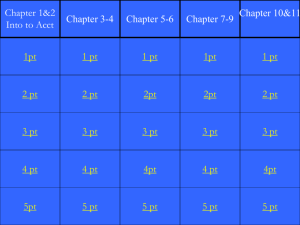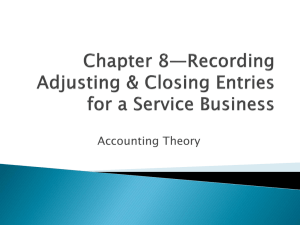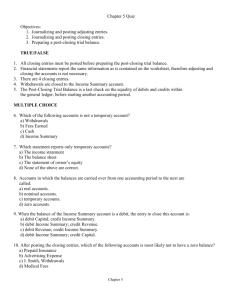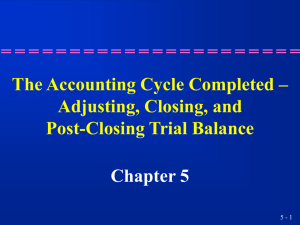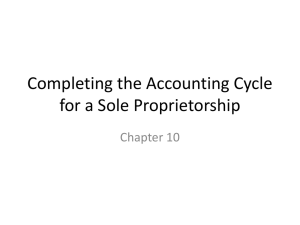Closing Entries and The Post - Closing Trial Balance
advertisement
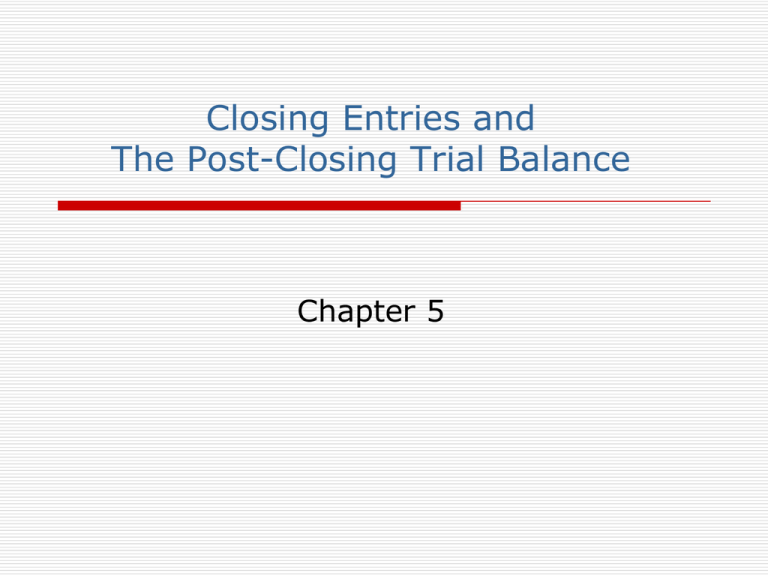
Closing Entries and The Post-Closing Trial Balance Chapter 5 Learning Outcomes List the steps of the accounting cycle Journalize and post closing entries Prepare a post-closing trial balance 9 Steps of Accounting Cycle 1. Analyze transactions and record in journal (Chapters 1 and 2) 2. Post journal entries to the ledger accounts (Chapter 3) 3. Prepare a trial balance (Chapter 3) 4. Gather adjustment data and record in worksheet (Chapter 4) 9 Steps of Accounting Cycle 5. Complete the worksheet (Chapter 4) 6. Prepare financial statements from worksheet (Chapter 4) 7. Journalize and post the adjusting entries from worksheet (Chapter 4) 8. Journalize and post the closing entries (Chapter 5) 9. Prepare a post-closing trial balance (Chapter 5) Closing Entries Purpose: to clear the “temporary” or “nominal” accounts Revenue Expenses Drawing Income Summary We “close” the books because this information pertains to only one fiscal period Closing Entries These accounts provide information for Income Statement Statement of Owner’s Equity “Permanent” or “real” accounts provide information for the balance sheet Real/Permanent accounts are: Assets Liabilities Owner’s Equity New Account For Closing Income Summary Used only for closing accounts and adjusting for merchandise (later on) You “zero out” the account you are closing with a debit or a credit (the opposite of which side the account’s balance is on) and the second entry is to the Income Summary account Steps in Closing Accounts (1) Close Revenue to Income Summary Normal balance of revenue accounts is credit Debit the revenue account the same amount making balance zero Credit Income Summary Income from Services $5,000 $5,000 (normal balance side) Income Summary $5,000 Steps in Closing Accounts (2) Close each Expense Account to Income Summary Normal balance of each Expense account is debit Credit the expense account the same amount making balance zero debit Income Summary Utilities Expense $350 (normal balance side) $350 Income Summary $350 $5,000 Bal: $4,650 Steps in Closing Accounts Close each Expense Account to Income Summary Normal balance of each Expense account is debit Credit the expense account the same amount making balance zero debit Income Summary Depreciation Expense, Equipment $550 (normal balance side) $550 Income Summary $350 $550 $5,000 Bal: $4,100 Steps in Closing Accounts Close each Expense Account to Income Summary Normal balance of each Expense account is debit Credit the expense account the same amount making balance zero debit Income Summary Salary Expense $1,000 (normal balance side) $1,000 Income Summary $350 $550 $5,000 Bal: $3,100 $1,000 Steps in Closing Accounts Close each Expense Account to Income Summary Normal balance of each Expense account is debit Credit the expense account the same amount making balance zero debit Income Summary Rent Expense $1,200 (normal balance side) $1,200 Income Summary $350 $550 $1,000 $1,200 $5,000 Bal: $1,900 Steps in Closing Accounts (3) Close Income Summary to Capital Normal balance of Income Summary account is credit (if you show Net Income) Debit the Income Summary account the same amount making balance zero Credit the Capital account by the same amount Capital Previous balance: 20,000 $1,900 New balance: 21,900 Income Summary $1,900 $1,900 Bal: $1,900 (Normal balance side) New balance = $0 Steps in Closing Accounts (4) Close Drawing to Capital Normal balance of Drawing is debit (contra) Credit the Drawing account the same amount, making balance zero Debit the Capital account to “reduce” it by how much the owner took out of the business Drawing $1,000 (normal balance side) $1,000 Capital $1,000 Previous balance $21,900 (new balance: $20,900) Next, Journalize the Closing Entries Center the title “Closing Entries” on a line in the Journal No explanation is necessary after each entry Debits must equal credits Chapter 5 GENERAL JOURNAL PAGE____4_____ DATE 1 2005 2 June DESCRIPTION POST. REF. DEBIT CREDIT Closing Entries 30 3 Income from Services 1 5 0 0 0 00 Income Summary 2 5 0 0 0 00 4 5 3 4 30 Income Summary 3 1 0 0 00 5 6 Utilities Expense 3 5 0 00 6 7 Depreciation Expense, Equipment 5 5 0 00 7 8 Salary Expense 1 0 0 0 00 8 9 Rent Expense 1 2 0 0 00 9 10 11 10 30 12 Income Summary 1 9 0 0 00 R. Gentry, Capital 11 1 9 0 0 00 13 14 15 16 12 13 30 R. Gentry, Capital R. Gentry, Drawing 1 0 0 0 00 14 1 0 0 0 00 15 16 Next, Post the Closing Entries Post the journal closing entries to the ledger accounts. Cross reference your journal and ledger page numbers. Draw a line through both the debit column and the credit column to show that the balance is zero. Lastly, prepare the Post-Closing Trial Balance This is to make sure the “books” are ready for the new fiscal period List only those accounts that have balances Debits must equal credits R. Gentry Consulting Services Post-Closing Trial Balance June 30, 2005 ACCOUNT NAME DEBIT 1 Do not list the accounts shown here in red – they will not have balances after they are closed. The difference (net income) is shown on the Income Statement. Cash 21 4 6 0 00 2 0 0 0 00 Supplies 1 0 0 00 Prepaid Insurance 3 3 0 00 0 0 0 00 Accounts Receivable 2 CREDIT 3 Equipment 4 Accumulated Depreciation, Equipment 5 Accounts Payable 15 12 0 0 0 00 5 7 0 0 00 2 9 0 00 20 9 0 0 00 5 0 0 0 00 Wages Payable 6 R. Gentry, Capital 7 R. Gentry, Drawing 8 Fees Income 9 Salary Expense 1 0 0 0 00 10 Rent Expense 1 2 0 0 00 11 Utilities Expense 3 5 0 00 12 Depreciation Expense, Equipment 5 5 0 00 13 1 0 0 0 00 R. Gentry Consulting Services Post-Closing Trial Balance June 30, 2005 ACCOUNT NAME DEBIT 1 Cash 21 4 6 0 00 2 0 0 0 00 Supplies 1 0 0 00 Prepaid Insurance 3 3 0 00 0 0 0 00 Accounts Receivable 2 CREDIT 3 Equipment 4 Accumulated Depreciation, Equipment 5 Accounts Payable 15 12 0 0 0 00 5 7 0 0 00 2 9 0 00 20 9 0 0 00 38 8 9 0 00 Wages Payable 6 13 14 R. Gentry, Capital 38 8 9 0 00 Chapter 5 Demonstration Problems Monday, October 8 E 5-1 E 5-3 Wednesday, October 10 E 5-4 E 5-7 P 5-1A Chapter 5 Homework Problem 5-2A (E-20) (textbook - page 168-169 + working papers - pages 109-110) Problem 5-3A (E-20) (textbook - page 169 + working papers - pages 112-113, 116-119) due October 17 Next Week: Monday: In-class Assignment #3 (Look at textbook pages 178 through 180 – could you do this problem?) Journalize transactions Post transactions to ledger accounts Prepare a Trial Balance Complete the work sheet with adjustments (continued) In-Class Assignment (continued) Prepare the Income Statement Prepare the Statement of Owner’s Equity Prepare the Balance Sheet Journalize the adjusting entries Post adjusting entries to ledger accounts Journalize closing entries (continued) In-Class Assignment (continued) Post the closing entries to the ledger accounts Prepare a post-closing Trial Balance You will have all class period on Monday, 10/15 – plus class time after quiz on Wednesday, 10/17 – plus all class period the following Monday (if needed) Midterm (Ch. 1-5) on Wednesday, October 24 (100 points) Monday Wednesday
